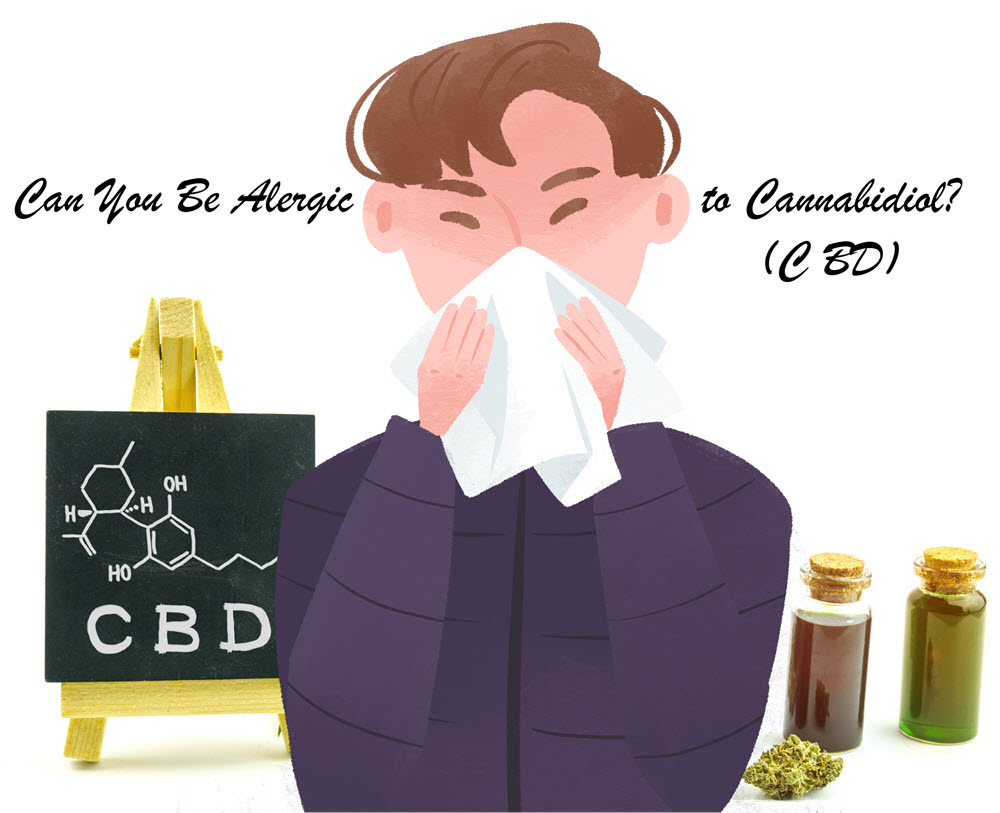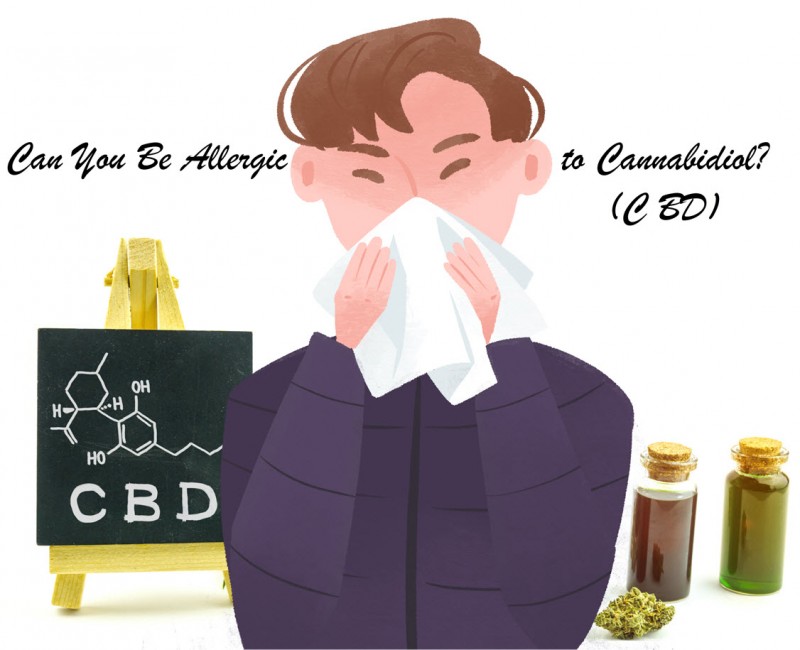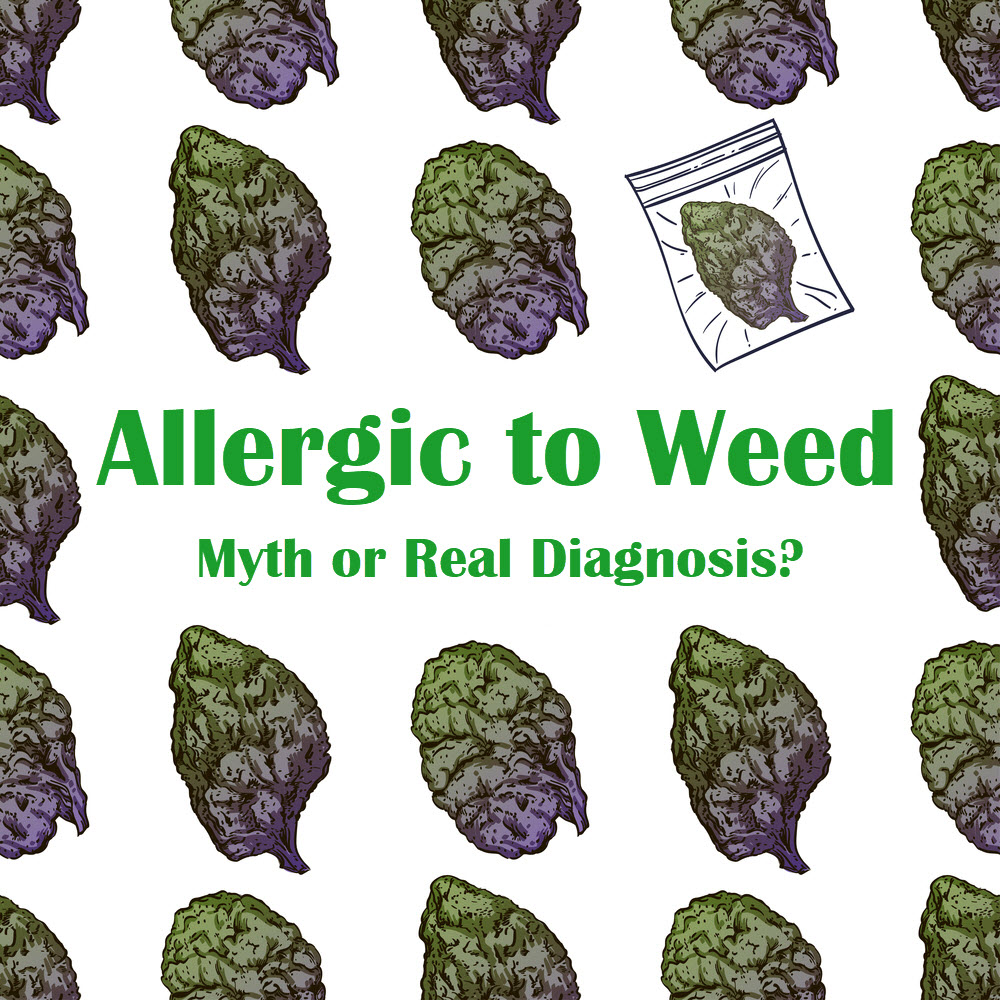Can You Be Allergic to Cannabidiol (CBD)?

An allergic reaction to CBD is possible although side effects from CBD are uncommon. CBD could even improve the symptoms of other allergies.
Allergies are quite common, and it’s likely that you’ve experienced them in some form. Allergies occur when an allergen enters your bloodstream and triggers an antibody response that leads to the production of histamine. Histamine then causes the classic signs of a reaction, from sneezing and itching to the more serious symptoms like restricted breathing and anaphylaxis.
If you have an interest in CBD, you may be concerned about possibly being allergic to cannabis. Cannabis consumption can lead to many allergic-like reactions, and there is some evidence that cannabinoids themselves may be allergens. As a cannabinoid, CBD could potentially induce an allergic reaction. But before deciding not to try CBD, here are the facts.
Can Someone Be Allergic to CBD?
CBD, or cannabidiol, is a cannabinoid that is found in cannabis. While CBD has gained a reputation for its therapeutic potential, those who suffer from allergies may be concerned as to whether an allergic reaction is possible from CBD oil.
Unfortunately, very little research exists into the allergic potential of CBD itself, although more is known about cannabis and allergies.
Cannabis pollen inhalation has been shown to induce symptoms such as asthma and rhinitis, and cannabis smoke exposure can result in allergic symptoms including sneezing, difficulty breathing, and an itchy throat (1).
Hemp seed oil consumption has also been reported to induce hives and sometimes those who take it find they have difficulty speaking and breathing (2).
Some reports have even described anaphylaxis responses to cannabis (3), indicating that cannabis, and potentially CBD, has the potential to induce an allergic reaction.
Cannabinoids have long been suspected to be allergens, and skin prick tests sometimes show positive reactions to cannabinoids (4), meaning there is some evidence that cannabinoids may be allergens and have the potential to induce an allergic reaction.
Another component of cannabis that can act as an allergen is a group of proteins called nsLTPs, or non-specific lipid transfer proteins. NsLTPs are plant proteins that are often found to act as food allergens (5), and one specific nsLTP called Can-s-3 is particularly relevant to cannabis.
Studies have found that an antibody binding band linked to Can-s-3 has been detected in cannabis allergy cases and that patients with a cannabis allergy can have a specific sensitization to Can-s-3 (6, 7). While research around nsLTPs and Can-s-3 is around the more broad cannabis allergy, as a product of cannabis, CBD could hold the same allergen proteins and induce the same reactions.
Allergic Reactions to CBD Oil
Based on what research indicates about cannabis reactions, an allergic reaction to CBD oil could induce symptoms including hives, itching, sneezing, difficulty breathing, and potentially even anaphylaxis in extreme cases.
Since cannabis, and potentially CBD, can contain the allergens like Can-s-3, one interesting reaction from CBD consumption is the cannabis-fruit/vegetable syndrome.
The cannabis-fruit/vegetable syndrome is a secondary cross allergy that seems to occur in the presence of ns-LTPs like Can-s-3. Patients with a cannabis allergy could find that they also have an allergy to fruits and vegetables like peaches, tomatoes, nuts, and tomatoes (8).
Cannabinoid consumption can also sometimes look like an allergic reaction but doesn’t actually induce an antibody response, it so can’t be classified as such.
Known as Cannabinoid Hyperemesis Syndrome (CHS), patients with this disorder experience lengthy periods of vomiting and nausea than can only be temporarily relieved with a hot shower. While more research is needed into CHS, it is thought that long term use of the cannabinoids CBD, THC, and CBG may alter the way that your digestive tract responds to cannabis and cannabinoids (9).
The risk of having an allergy to cannabis, and more specifically CBD, is low. But if you are worried about an allergic reaction, a CBD skin test or more advanced testing such as a histamine release assay can help to analyze your riks of an allergy (10).
Can CBD Oil Help with Allergies?
While CBD does carry some risk of an allergic reaction, it also contains properties that could help to ease the symptoms of other allergic reactions.
One of the most significant therapeutic benefits of CBD is its potential to act as an anti-inflammatory. Since allergic reactions can result in nasal and skin inflammation, and allergy treatments such as steroids actually work in part by reducing inflammation associated with allergies, CBD, could work to improve some of the symptoms of an allergic reaction.
CBD’s anti-inflammatory action is thought to occur through its activation of glycine receptors. When activated by CBD, these receptors can induce the suppression of inflammation (11).
One animal study found that CBD treatment managed to significantly reduce pancreatic inflammation in mice, (12) and a 2019 study found that CBD reduced inflammation in the human gut (13). While these studies don’t investigate the CBD’s anti-inflammatory action in allergic reactions specifically, they clearly demonstrate CBD’s potential to reduce inflammation. These studies indicate that CBD oil could be helpful in reducing some of the symptoms of an allergic reaction.
While CBD oil may offer you some relief from minor allergic reaction symptoms, it’s important to remember that if you suffer from a cannabis or CBD allergy, CBD oil won’t improve your symptoms. If you are worried about your reaction to any product, CBD, or otherwise, be sure to first consult your doctor before trying a new product or supplement.
The Bottom Line
More research is needed regarding CBD allergies; however, it could be possible for CBD oil to contain some of the allergens found in cannabis. Cannabinoids such as CBD could even be allergens themselves.
However, the risk of a reaction occurring from CBD oil use is low as most research into CBD treatment tells us that CBD is largely well-tolerated and most side effects are mild (14).
Plus, CBD’s anti-inflammatory actions may even help to reduce the side effects of allergic reactions to other products. When in doubt, ask your physician before using CBD oil or other CBD products.
Written by Writing Studio, a health science content writing company.
WEED ALLERGIES, READ MORE....
ALLERGIC TO WEED, IS IT ALL IN YOUR HEAD? CLICK HERE.
OR...
ARE YOU ALLERGIC TO MARIJUANA, IT COULD BE ALLERGIES!









